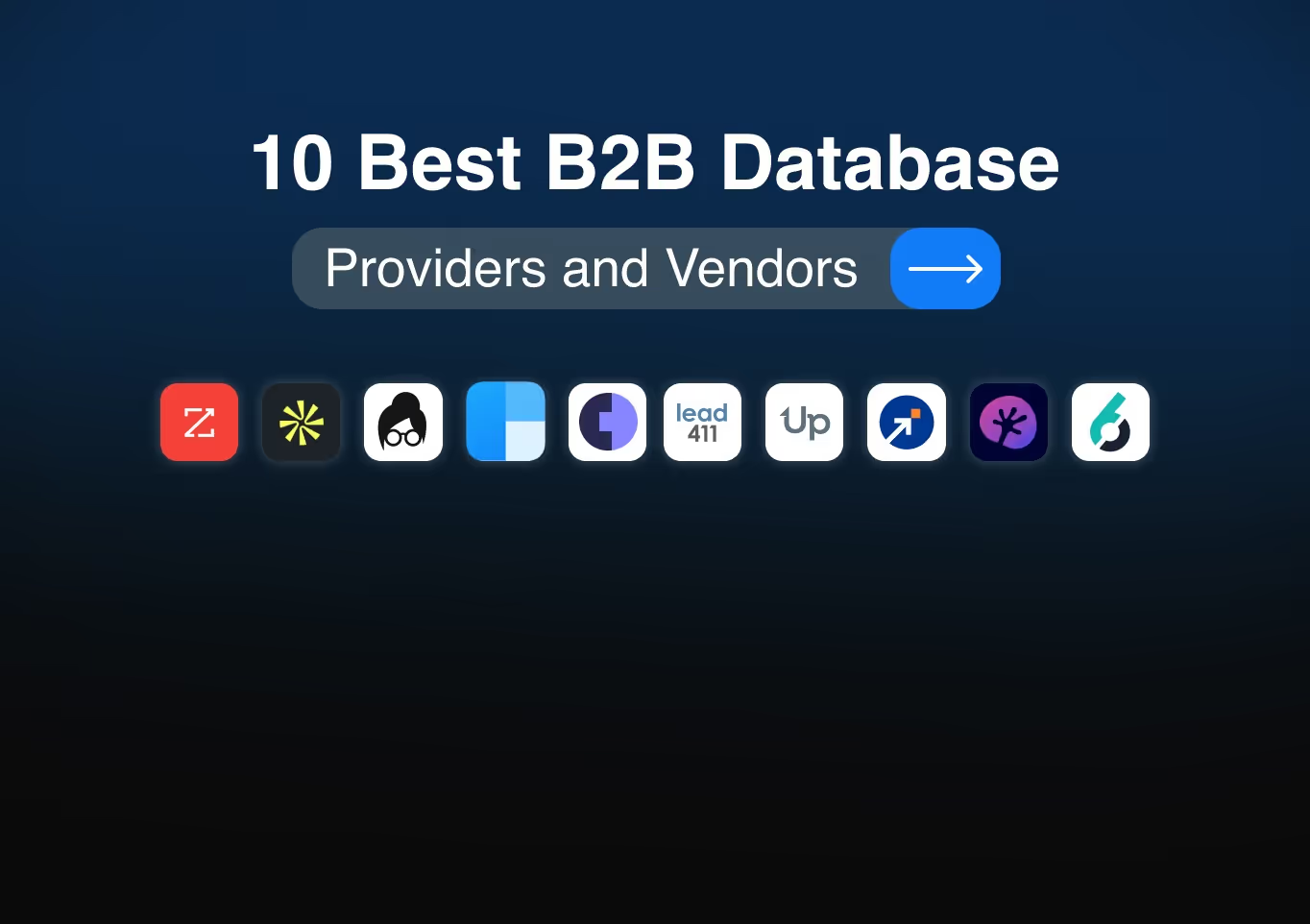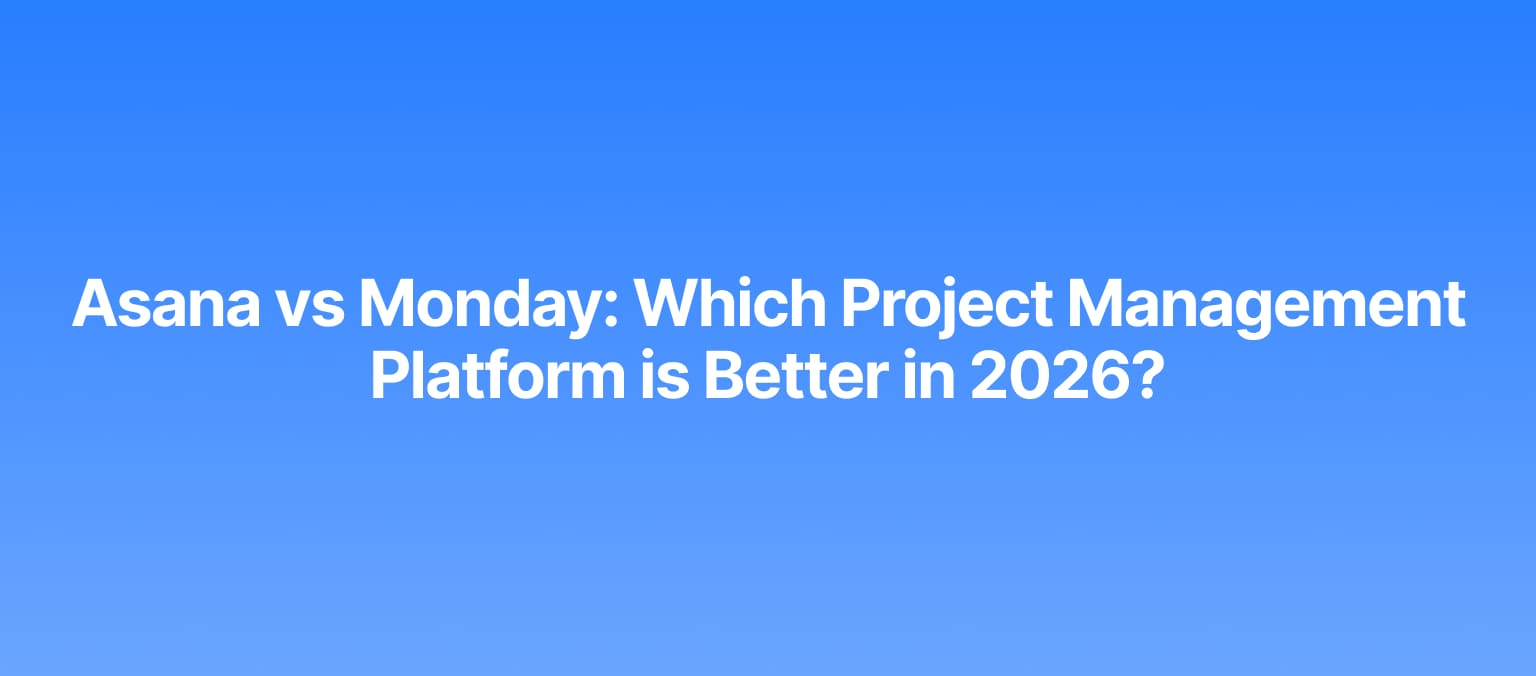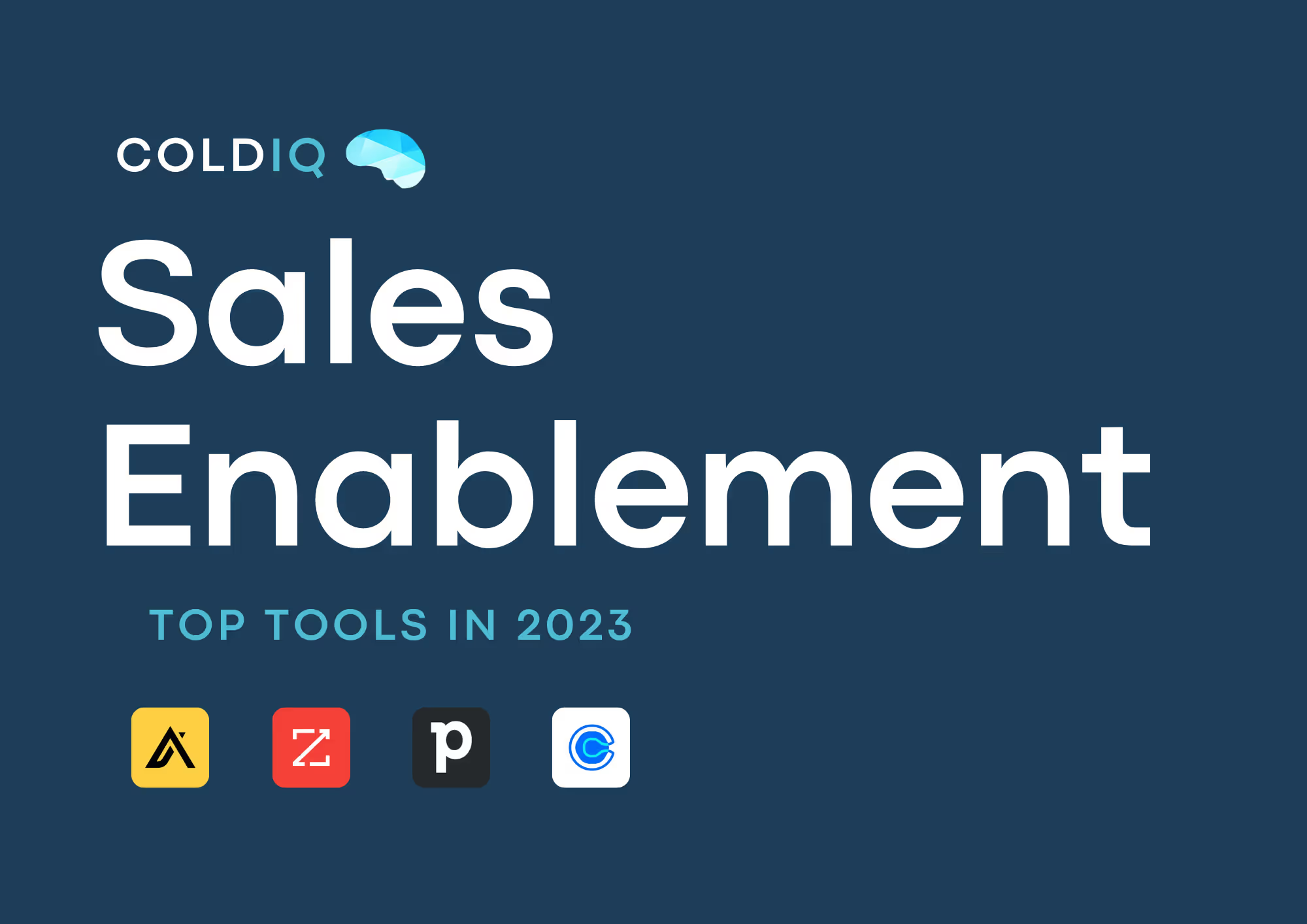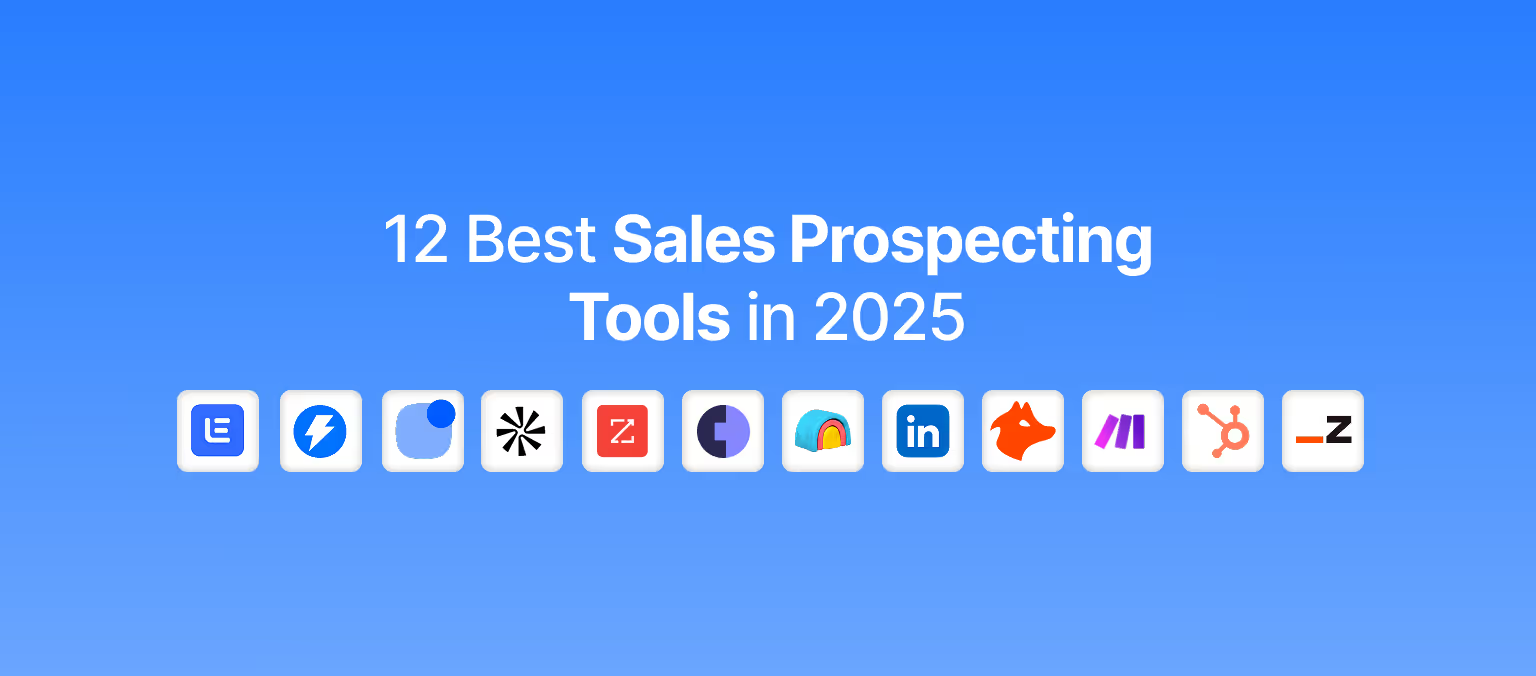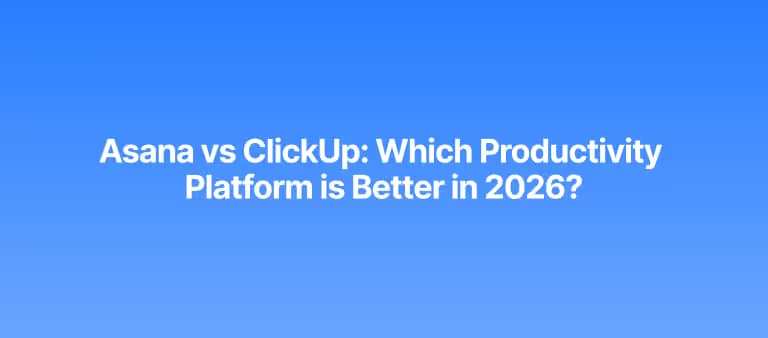10 Best B2B Database Providers and Vendors
If you waste hours chasing incomplete profiles, outdated contact information, or buying lead lists that barely convert, you’re missing out on sales opportunities that could convert. A good B2B database vendor doesn’t just offer you a list, they address the pressing problems your sales team faces – finding qualified leads for your sales pipeline. They also provide actionable signals that directly improve conversion rates.
In this guide, we will explore the best 10 B2B database providers that can help you connect with ideal decision-makers and boost your sales efforts. We will compare their key features, strengths, and weaknesses to help you make informed decisions. Let’s get started.
Top 10 B2B Contact Database Companies
Let’s explore the top 10 B2B contact database companies you can use to boost your sales efforts.
1. ZoomInfo

Best for: Enterprise-grade sales and marketing teams
Overview: One of the most well-known and robust B2B data platforms, offering detailed firmographic, technographic, and intent data with deep integrations into major CRMs and marketing platforms.
ZoomInfo is a go-to-market (GTM) intelligence platform designed to provide sales, marketing, and recruiting teams with a massive database of B2B contacts and companies. Think of it as an online data-driven directory that lets you find the right people in the right companies at the right time.
ZoomInfo collects, validates, and delivers contact data, company info, and intent signals into one platform, allowing you to connect with ideal decision-makers and grow your pipeline faster.
It’s suitable for:
- Sales teams who intend to reach the prospects at the right time
- Marketing teams that run ABM campaigns
- Recruiters who want to hire top talent for companies.
What sets ZoomInfo apart is its accurate data, which is sourced in real-time. It goes beyond basic contact details, as it delivers intent signals, firmographic, and technographic data that shows companies are actively researching your solutions. That’s not raw data you can overlook — they are real opportunities delivered straight into your pipeline.
Key Features
- Contact and company database of 260 million professionals and 100 million companies.
- Intent signals that alert you when your prospects show interest in your solutions.
- Real-time lead enrichment to ensure data quality.
Pros
- Vast, accurate database to help SDRs focus on the right prospects.
- Buying signals that show active buyers, not passive ones.
- Seamless integrations with third-party platforms.
Cons
- Higher pricing when compared to other vendors.
- Steep learning curve that takes time to master.
Pricing
Contact the sales team for a quote.
2. Apollo.io
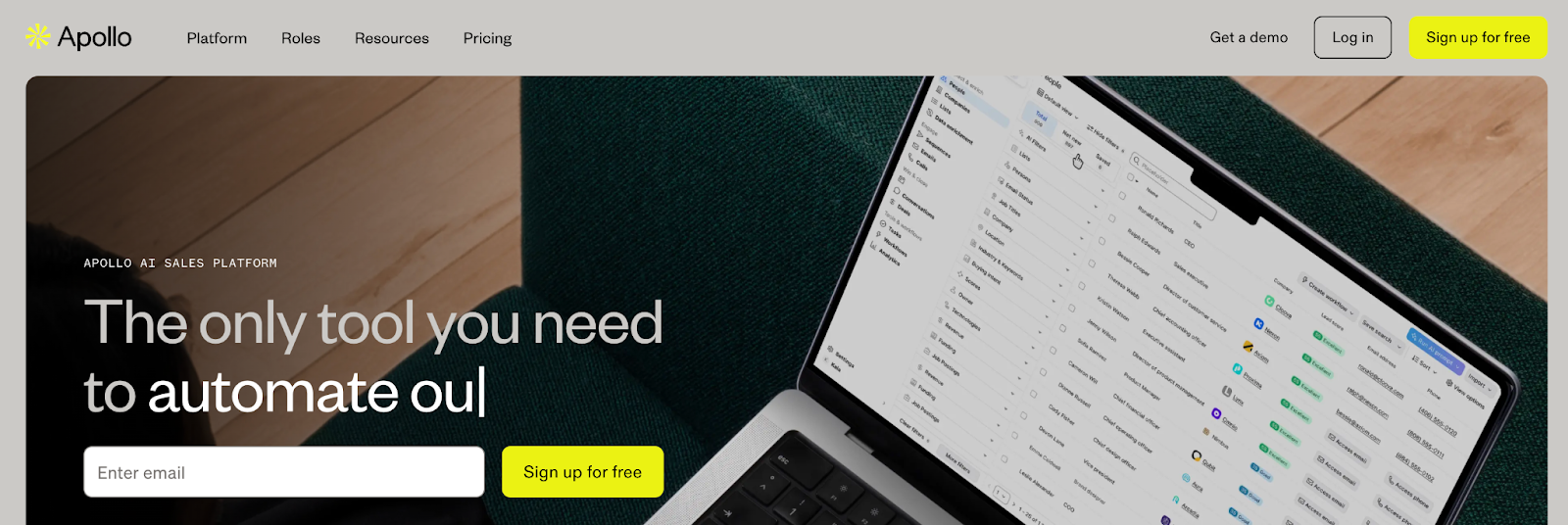
Best for: Startups and mid-sized sales teams on a budget
Overview: Combines a large B2B contact database with a sales engagement platform, allowing users to prospect, email, and track directly within one interface.
Key Differentiators: Built-in email automation, free plan with generous usage, Chrome extension for LinkedIn prospecting.
Apollo is a comprehensive sales intelligence platform that helps sales teams to prospect, engage, and close deals. With its extensive B2B database, sales teams can connect with their ideal decision-maker and drive revenue growth.
Apollo transforms how SDRs approach their sales process with verified contact data, buying signals, and engagement tools to find qualified leads faster. It’s perfect for sales teams, marketing, and growth teams who are tired of paying for leads and want to scale their outbound efforts.
Apollo stands out for providing data and outreach features to find and engage your prospects effectively. It’s an all-in-one prospecting solution, so you don’t have to jump between databases and outreach tools.
Key Features
- B2B lead database with 210+ million verified contacts and 65+ advanced search filters.
- Buying signals to seize the right sales opportunity at the right time.
- Sales engagement features to craft personalized sequences and perform multi-channel outreach.
Pros
- Intuitive interface that requires minimal learning and is easy to adopt.
- Offers data accuracy to small and mid-sized companies.
- Affordable for startups and scalable for large companies.
Cons
- Deliverability issues can happen if you don’t warm up domains.
- Some advanced features require a steep learning curve, which takes time.
Pricing
Apollo offers a free trial with limited credits, but its paid plans start at $59 per month/user
3. Lusha
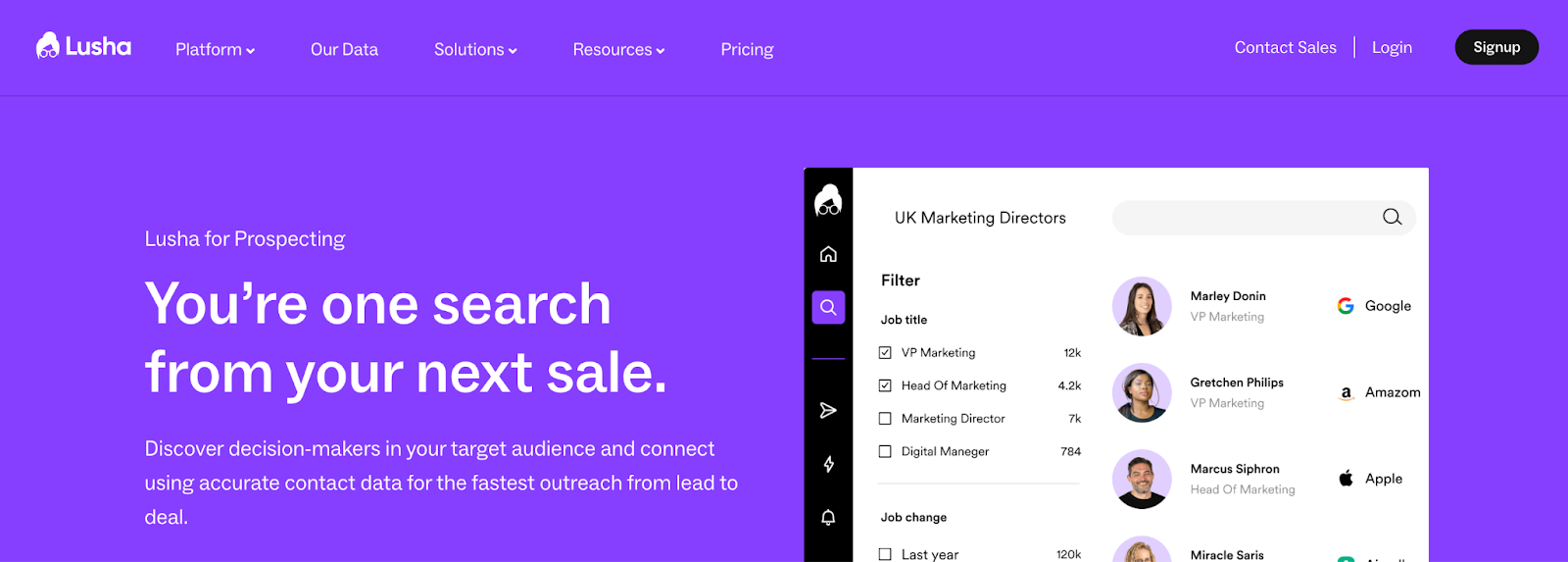
Best for: B2B sales reps who prospect via LinkedIn
Overview: A lightweight, easy-to-use tool for finding direct dials and emails of professionals, often used alongside LinkedIn Sales Navigator.
Key Differentiators: Browser extension, user-friendly UI, fast contact lookup, focus on compliance (GDPR, CCPA).
Lusha is a B2B contact database provider that allows sales and marketing professionals to obtain relevant information about ideal prospects, whether individual contacts or companies. With its Chrome extension, you can find prospects’ details on LinkedIn and other websites.
Lusha provides verified information — email addresses, phone numbers, and company data — on decision-makers across companies. It integrates with various third-party tools so you can pull data in real-time when you’re prospecting. It helps SDRs, marketing teams, and RevOps to connect directly with prospects.
Unlike other tools, the AI sales prospecting tool stands apart for its accurate data, which undergoes a triple verification process to ensure you’re not working with outdated information. Besides, it seamlessly integrates into your existing workflow, driving efficiency.
Key Features.
- Intent signals that help you to prioritize leads that are actively searching for your solution.
- A data enrichment feature that automatically enriches your lead list with up-to-date information.
- Chrome extension that integrates with your browser to collect data without breaking your workflow
Pros
- Its user-friendly interface requires a minimal learning curve and makes it easy to use.
- It offers accurate data to connect directly with your prospects
- The platform is CCPA and GDPR compliant, making it easy to avoid legal sanctions when doing outreach internationally.
Con
- It offers a credit-based pricing model that can get exhausted fast when scaling.
Pricing
Lusha offers a free plan with limited credits, but its paid plan costs $29.90 per month/user.
4. Clearbit
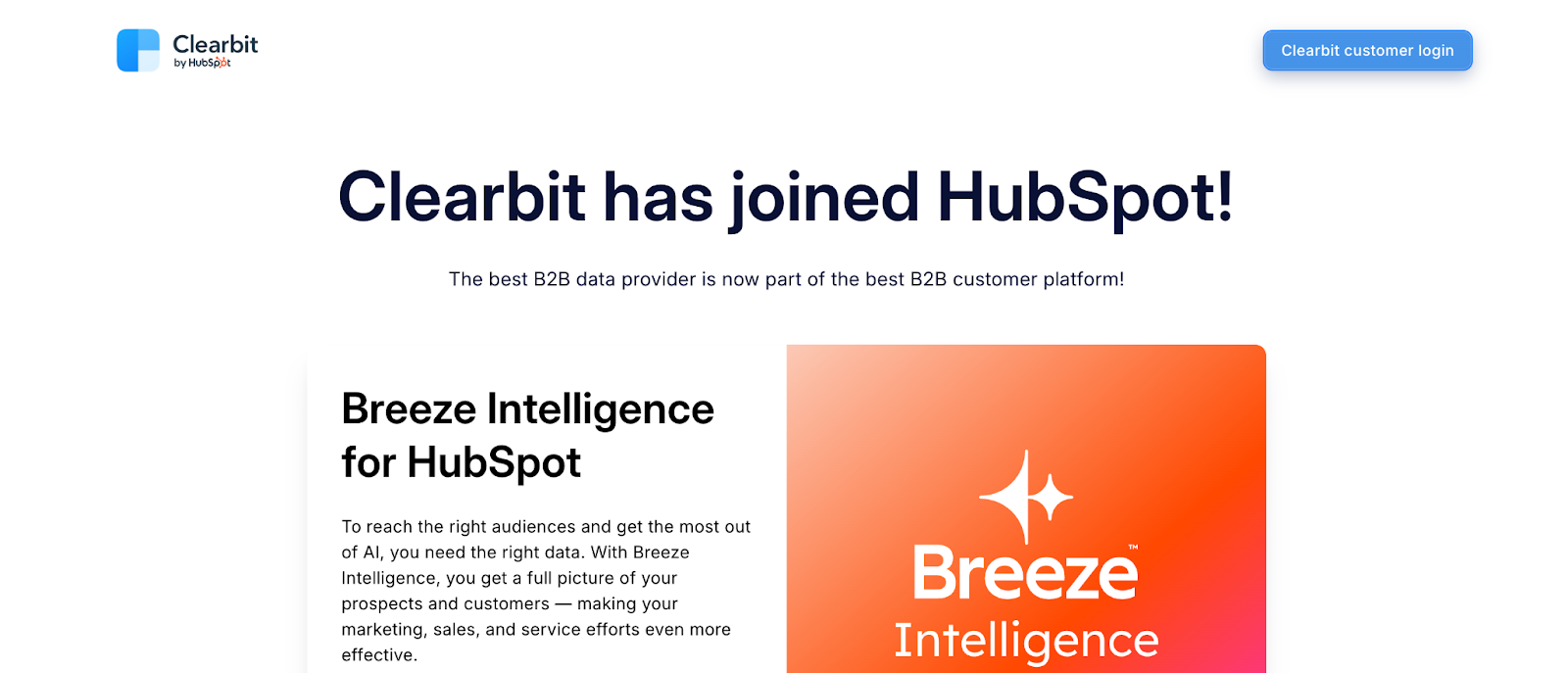
Best for: B2B marketers who want data-driven personalization
Overview: Offers real-time firmographic enrichment for website visitors and leads, enabling smarter targeting and segmentation in marketing workflows.
Key Differentiators: Real-time API, Reveal product for IP-based company identification, strong Salesforce and HubSpot integrations.
Owned by HubSpot, Clearbit is another B2B data intelligence platform designed to help sales teams identify and connect with their ideal buyers. It provides a full picture of your prospects, allowing you to target and segment leads effectively.
Clearbit collects and processes data from diverse sources like CRMs, websites, and marketing tools to obtain real-time data about your leads. This allows your sales teams to tailor their efforts where it matters most.
Clearbit stands out for its real-time, enriched data that provides full context about your ideal buyers. Besides, its API-first approach allows you to integrate with a third-party system, enhancing your sales workflow.
Key Features
- A prospecting feature that uncovers detailed information about your ideal buyers to build a targeted list.
- Reverse IP lookup to de-anonymize your web visitors so you can identify unknown visitors.
- An enrichment feature that boosts more data coverage to advance your prospecting efforts.
Pros
- It offers real-time, accurate data to find your qualified prospects.
- It maximizes data coverage to uncover prospects’ accurate contact data and reach them.
- It integrates seamlessly with third-party tools.
Cons
- Its user interface can require a steep learning curve, which can take time to understand.
- The pricing model may not be suitable for smaller teams or businesses.
Pricing
Contact the sales team for a quote.
5. Cognism
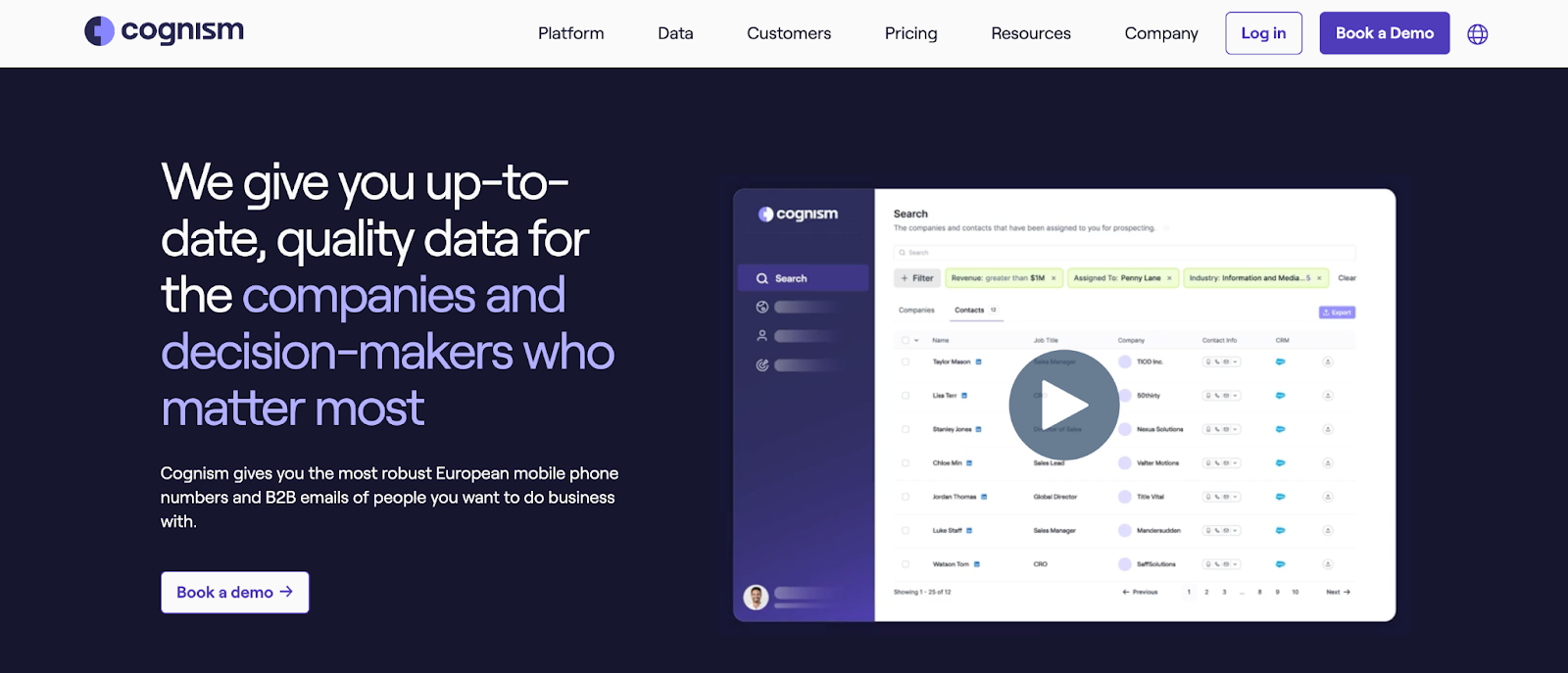
Best for: GDPR-compliant prospecting in Europe and North America
Overview: Offers a compliant contact database with intent and technographic data, focused on enabling outbound sales across strict data privacy environments.
Key Differentiators: GDPR-first database, mobile numbers at scale, Diamond Data® verified contacts, compliance guarantees.
Cognism is a sales intelligence platform that provides quality, up-to-date data, seeking to advance their prospecting efforts. It’s particularly useful for companies seeking to expand into the European market.
Powered by its AI technology and machine learning algorithm, Cognism grants access to a database of verified contact and company information. They escape and verify data from different sources so you can reach your ideal prospects. They are useful for sales teams, revenue leaders, or demand generation marketers.
Cognism not only stands out for its data quality, but also compliance with regulations like GDPR and CCPA. This makes their data easy to use without having legal issues.
Key Features
- A contact database that’s checked against the DNC list.
- Intent data to find and prioritize accounts interested in your solutions.
- Chrome extension that integrates seamlessly into your workflow.
Pros
- It has a strong international coverage, especially in Europe.
- It offers quality phone data to reach your prospects.
- It integrates with CRMs and other sales tools seamlessly.
Cons
- It’s a premium tool that may not be suitable for small sales teams or businesses.
- It has a steep learning curve that requires users to properly understand the tool before adoption.
Pricing
Contact the sales team for a quote.
6. Lead411
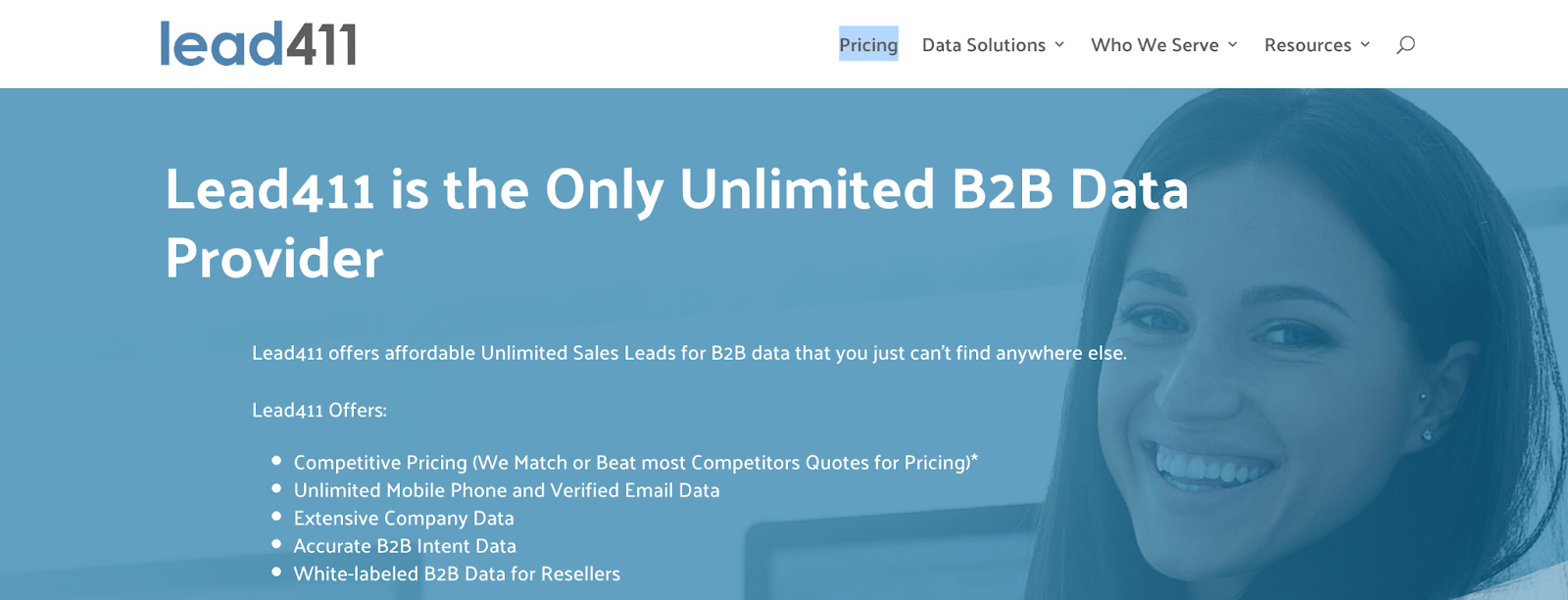
Best for: SMBs looking for verified leads and intent data
Overview: Affordable alternative to ZoomInfo offering verified emails, phone numbers, and intent triggers for U.S. companies.
Key Differentiators: Human-verified data, buyer intent alerts, email automation features, strong customer support.
Next on the list is Lead411. The sales intelligence platform is designed to help sales teams fuel their pipeline with qualified leads. It offers verified contact and company data to scale your outbound sales efforts.
The AI-powered sales prospecting tool delivers accurate contact information, company data, and sales triggers to build relationships and close deals with potential customers.
Lead411 stands out for its buyer intent data that allows you to prioritize prospects who are most likely to convert. It focuses on what matters — helping businesses build stronger relationships and closing deals.
Key Features
- An extensive database that provides detailed information about decision-makers.
- Verified email addresses and phone numbers to help you reach your prospects.
- Chrome extension to power your sales workflow.
Pros
- Its trigger-based approach allows you to meet the right prospects at the right time.
- It provides accurate contact information to reach and engage with prospects.
Cons
- Its data mainly focuses on North America, which may not be suitable for anyone who intends to expand internationally.
- Its user interface isn’t intuitive and requires some mastery.
Pricing
Lead411 offers a 7-day free trial, but its paid plans start at $99 per month/user.
7. UpLead
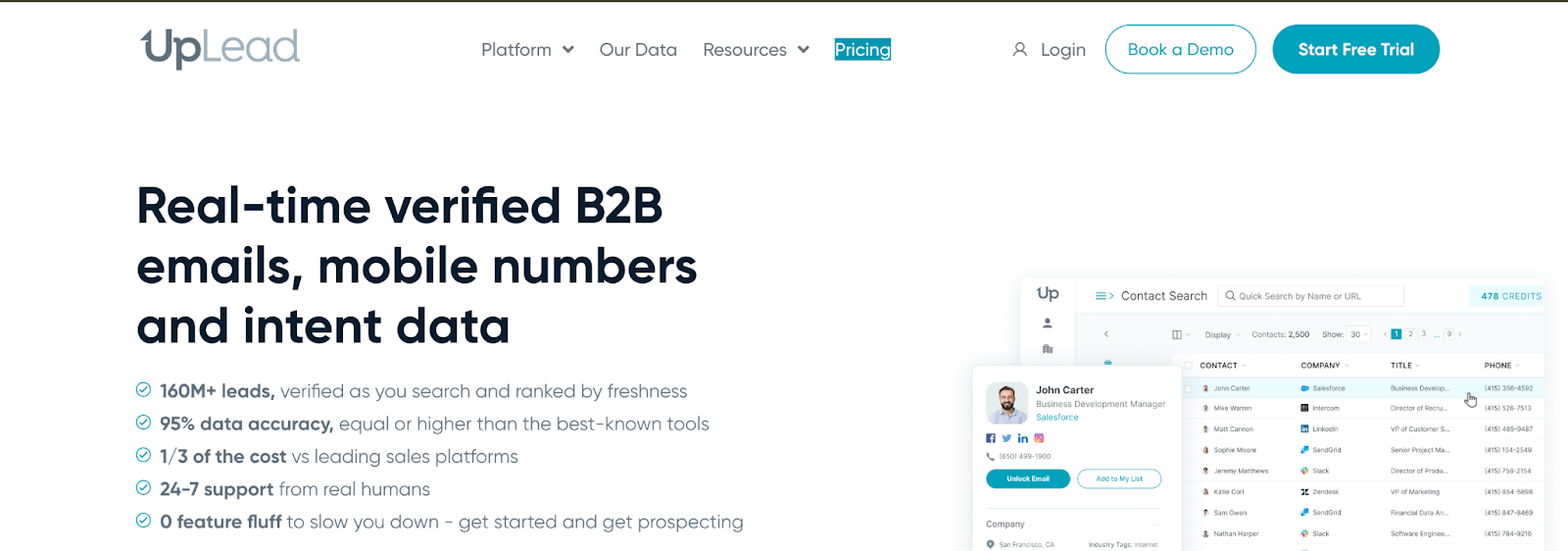
Best for: Teams that prioritize data accuracy and transparency
Overview: B2B contact and company data with a strong emphasis on 95%+ accuracy and easy filtering.
Key Differentiators: No-contact-no-credit policy, technographics, data enrichment tools, competitive pricing.
UpLead is a B2B lead generation platform that provides various features to advance your prospecting efforts. Whether it’s an extensive database, verified contact information, or intent signals, these tools provide all you need to connect with your decision maker.
Uplead connects you with your ideal buyers by providing detailed information about them or signals to seize the right opportunity. Sales teams can leverage the tool to obtain verified contact information and reach their prospects.
What sets Uplead apart is its real-time email verification that provides up-to-date information without wasting your outreach efforts.
Key Features
- Prospector that features advanced filters to find your ideal buyers.
- An email verification feature that finds a prospect’s accurate email addresses.
- Chrome extension that lets you find prospects when browsing LinkedIn or any company website.
Pros
- Its interface is user-friendly as it requires a little onboarding process.
- Its verified data allows you to reach your prospects easily.
Cons
- It has a smaller database when compared to other database providers.
- Its pricing model could be more affordable.
Pricing
Uplead offers a 7-day free trial, but its paid plans start at $99 per month with limited credits.
8. SalesIntel
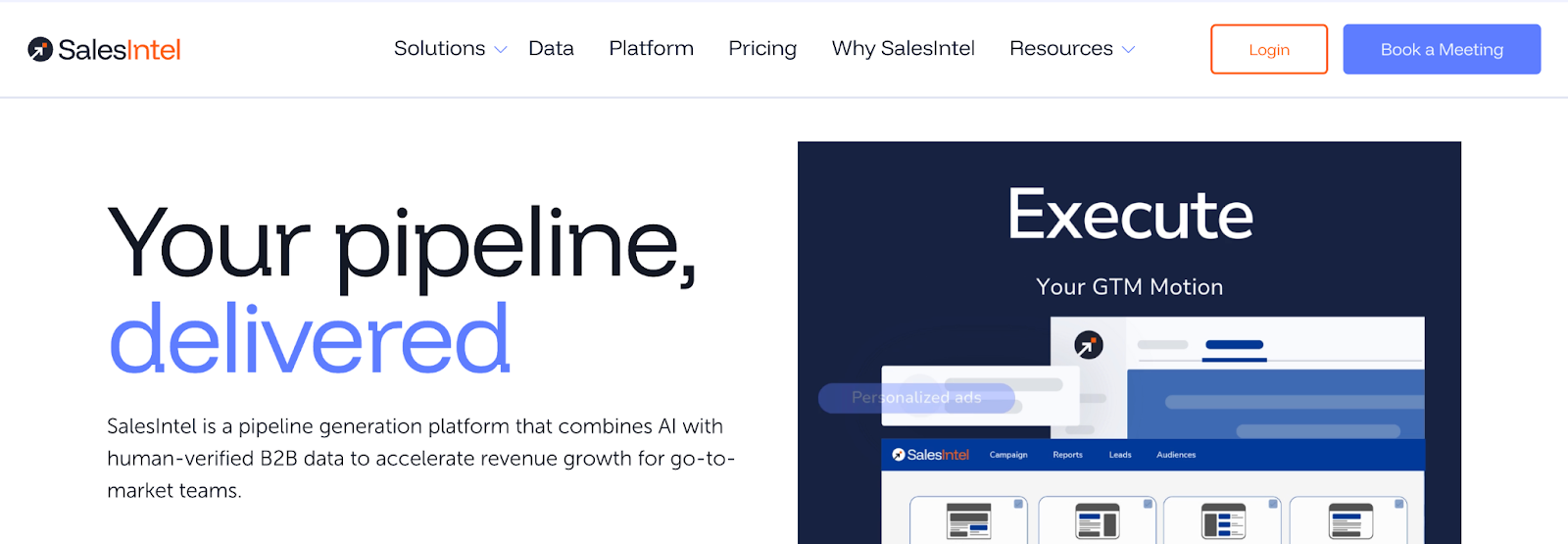
Best for: Teams needing human-verified B2B contact data
Overview: Combines machine-sourced data with manual verification by a research team, with high match rates and deep firmographics.
Key Differentiators: Research-on-demand, intent data integrations (Bombora), quality over volume approach.
SalesIntel is another B2B database provider that helps marketing and sales teams find accurate, actionable leads. Their goal is to connect you with decision-makers who can add more value to your pipeline.
With its powerful AI technology, SalesIntel provides accurate B2B lead data – email addresses, phone numbers, and buying signals. They help you avoid all the guesswork and enable you to focus on one thing – selling smarter and faster. It’s perfect for sales and RevOps teams that want to prospect effectively and focus on sales performance.
What makes SalesIntel is its verification process. Rather than relying on data scraping and guesswork, they verify the data manually. This prevents you from wasting your efforts and focusing on what truly matters – closing deals.
Key Features
- Prospect Intel, which provides the right data — contact details, firmographics, technographics, intent data, and news — to advance your prospecting efforts.
- ICP Intel, which allows you to define your ICP for better lead generation.
- Native integration with CRMs and other sales outreach tools.
Pros
- Provides real-time buyer intent data to help you prioritize the most promising prospects.
- Excellent customer service to cater to customers’ needs.
Cons
- The UI isn’t intuitive, as it feels clunky compared to other tools
- Its premium pricing plans may affect smaller teams.
Pricing
Contact the sales team for a quote.
9. Adapt.io

Best for: Basic contact data for sales prospecting
Overview: A simple contact database with an emphasis on affordability, Chrome extension functionality, and CRM syncing.
Key Differentiators: Easy-to-use platform, focus on lead generation, good fit for smaller teams.
Adapt.io is a B2B database provider that provides sales teams with actionable contact information to boost their outbound sales efforts. See it as a secret weapon you can use to reach decision makers faster.
The AI lead generation tool provides human-verified information — email addresses, phone numbers, job titles, company data — right into your workflow. It helps SDRs, marketers, and recruiters connect with the right people at the right time.
The B2B vendor is a solid platform that sales teams can leverage to obtain accurate data without wasting their time and resources. It’s great for smaller teams who can’t afford the heavy fees while scaling their operations.
Key Features
- A prospecting feature that provides detailed information about your ideal buyers so you can build a targeted list.
- An enrichment feature that provides clean data to avoid wasting your time.
Pros
- Strong emphasis on data accuracy and quality.
- User-friendly interface that requires minimal training and ensures quick adoption.
Cons
- Smaller database when compared to enterprise giants.
- Limited integration with third-party tools.
Pricing
Adapt.io offers a 7-day free trial, but its paid plans start at $49 per month.
10. Slintel (now part of 6sense)
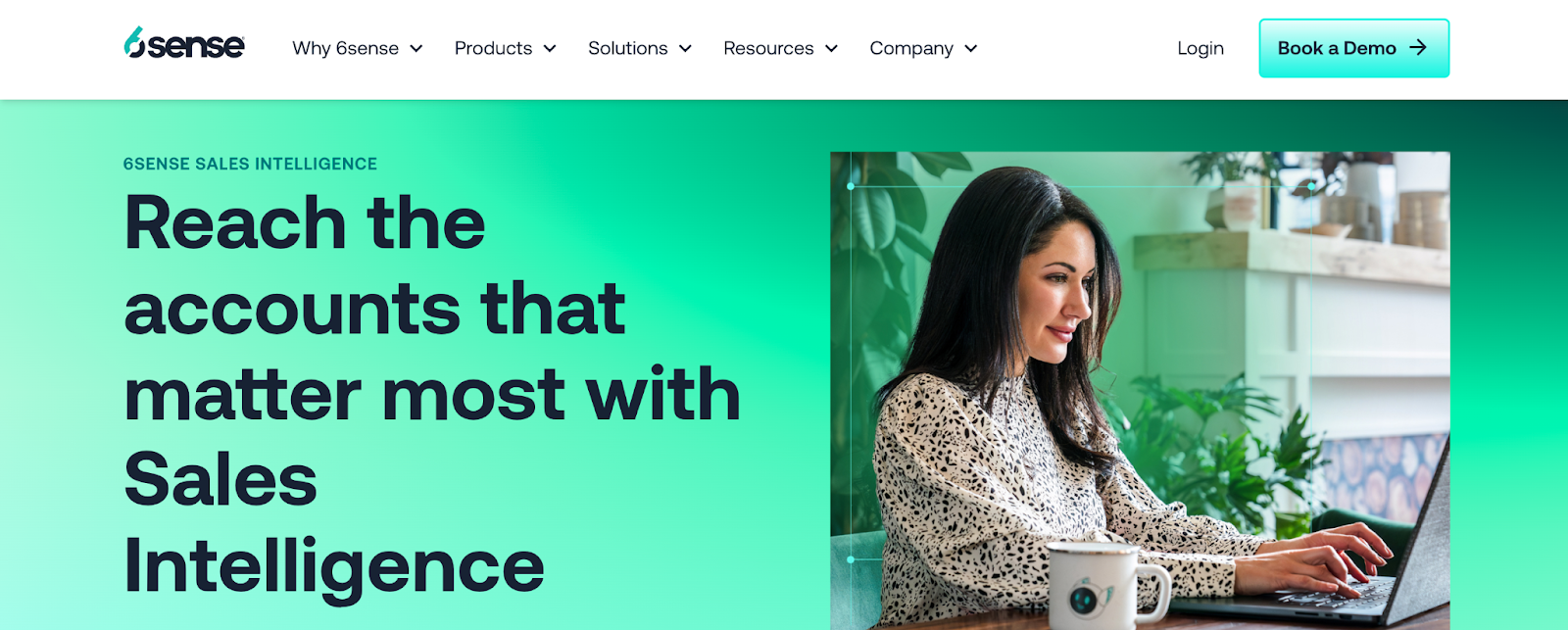
Best for: Intent-based marketing and technographic segmentation
Overview: Focuses on analyzing buyer intent and technology stack data to help go-to-market teams prioritize accounts and leads.
Key Differentiators: Integration with 6sense, strong technographic data, predictive lead scoring based on buyer journey signals.
Our final option on the list is Slintel. The intent-based marketing platform offers real-time data on prospects who are actually ready to buy from you.
Slintel combines technographic data with buyer intent signals to identify prospects actively searching for solutions like yours. They help sales teams, revenue leaders, and account executives boost their sales efforts.
Slintel is renowned for its technographic intelligence that shows your prospect’s sales tech stack. It’s also known for its buyer intent data that allows sales teams to tailor their efforts to those who are more likely to buy.
Key Features
- Technographic data provides detailed information on the tool a company is currently using.
- An intent data engine that tracks tons of buying signals to provide one that indicates your prospects’ interest in your products or services.
- Web deanonymization to make your anonymous web visitors a known account.
Pros
- A user-friendly interface that is easy to use and navigate.
- Strong ethnographic insights about your prospect’s tech stack.
Cons
- Smaller database when compared to other database vendors.
- Its pricing plan may be expensive for small teams and businesses.
Pricing
Contact the sales team for a quote.
Also Read: The Ultimate Guide to AI Sales Lead Generation
Key Criteria for Choosing a B2B Data Vendor
With so many B2B data vendors, it’s essential to choose wisely to avoid wasted efforts. Here are some key criteria to consider before choosing a B2B data vendor.
1. Data accuracy and recency
Inaccurate data will mislead and waste your sales efforts. As a result, you need accurate and recent data to scale through. Consider the vendor’s collection methods, sources, and verification process to determine the quality of the data. Look for vendors who offer accurate, recent, and reliable data. This ensures you’re targeting the right prospects and not wasting time and resources chasing the wrong leads.
2. GDPR and CCPA compliance

Before you choose a data vendor, verify whether they’re compliant with data regulations such as the GDPR and CCPA. Look for indicators that show whether they’re compliant. Check if they:
- Have a compliance certification
- Comply with data security standards like SOC 2 Type II
- Adhere to industry best practices
- Have a transparent privacy policy.
Verifying their compliance status helps to prevent some legal sanctions that could impact your business.
3. Depth and breadth of firmographic/technographic data
Most B2B data providers go beyond providing intent data for customers. They also provide in-depth firmographic and technographic data to ensure the prospects align with your business. As a result, make sure to have a clear understanding of the kind of data a vendor provides to determine whether they have what you need. Also, ensure that these data cover the breadth and depth that you need.
4. Integrations with CRMs and sales tools
A B2B data vendor that doesn’t integrate seamlessly with existing systems will disrupt your workflow. Due to this, make sure to consider whether they integrate with your current tech stack, like CRMs, outreach tools, and other tech you use. Smooth integration helps to drive efficiency in your sales process.
5. Customer support
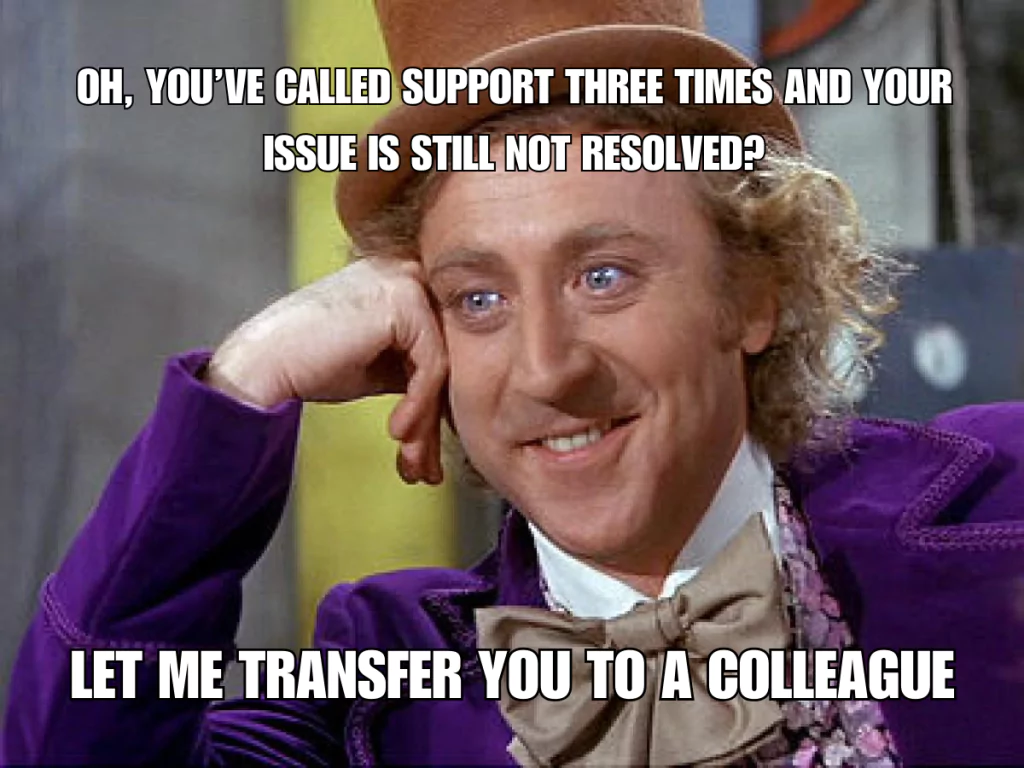
If your desired B2B data vendor doesn’t have customer support, chances are you won’t resolve your queries when issues arise. As a result, find a reliable vendor that offers excellent customer support to answer your questions and solve any issues that may arise when using the products.
6. Pricing transparency and scalability
Reviewing the cost offered by B2B data vendors is essential to determine whether the cost meets your budget. If their fees aren’t publicly displayed, check for hidden fees that you may incur in the budget. Also, select a vendor that allows scalability and accommodates future changes as you grow your business.
How to Test and Compare Providers Before You Buy
1. Using free trials and demos effectively
Many B2B data vendors offer a free trial for their services. Leverage this opportunity to check out the features and determine whether it fits your needs. For instance, you may check whether it integrates with your tech stack.
2. Benchmarking data accuracy and match rates
Test out the database, including the search functions and filters, to determine the quality and accuracy of the data. Identify the number of contacts it provides that match your ideal customer profile (ICP).
You can also check whether their database supports needs across diverse regions. For instance, if your business has customers across the US and Europe, ensure to check whether the vendor can supply relevant leads’ details in those regions.
3. Questions to ask sales reps

Before you choose a B2B database provider, you may want to clarify some concerns with a sales representative. Here are some questions you want to ask sales representatives:
- What industries or company sizes do you specialize in? Are there any gaps in coverage?
- How often do you update your database? What’s your verification process
- Can you share case studies from companies similar to mine?
- How do you handle data compliance with regulations like GDPR and CCPA?
- Beyond the basic subscription, what additional costs can we incur?
Asking these questions will provide valuable answers that help you determine whether you should choose the database provider.
4. Strategies for running a pilot program
Making a full commitment without running a pilot program can waste resources and increase risk. For instance, the database provider could become incompatible with your existing system, creating disruption in your sales workflow. However, running a pilot program helps to foresee these risks and avoid any problems that may arise.
Here are some strategies for running a pilot program:
- Establish clear goals and objectives that you wish to learn from the pilot
- Start with a limited scope to manage complexity and define a timeframe to carry out the pilot, e.g,. 30 days.
- Choose 2-3 vendors that fit your requirements
- Create identical test cases for each provider
- Gather quantitative and qualitative feedback to measure performance
- Evaluate the total cost of ownership, including any hidden fees.
- Consider exiting if the provider doesn’t meet your expectations.
- Design an implementation strategy for a successful pilot.
Conclusion
Poor data vendors deliver more than wrong numbers — they waste your time, let you miss out on valuable sales opportunities, and impact your ROI. However, choosing the right database vendor provides quality data that allows you to hit your sales target and maximize your returns.
This is why you should partner with ColdIQ. Our sales experts leverage the right AI sales tools, including the right B2B database provider, to find the right opportunities and scale your outbound efforts. Book a demo with us today!
Frequently Asked Questions about B2B Database Providers and Vendors
1. What Is a B2B Database Provider?
A B2B database provider is a company that gathers and sells business-related information to help other businesses find, connect, and engage with potential customers. These pieces of information include company details, buying signals, contact information, and relevant industry insights.
2. Why B2B data vendors matter
B2B data vendors are crucial for gathering relevant data from private and public sources to help companies connect and engage with their ideal buyers, ultimately building genuine relationships and driving revenue growth.
3. How can the value of B2B data vendors be maximised?
To maximize the value of B2B data vendors, make sure you select the right vendor that aligns with your needs, integrates seamlessly with existing systems, and leverages the insights to build a targeted lead list for your cold campaigns.
FAQ
A reliable B2B database updates its records regularly and verifies contacts through multiple sources. Consistent maintenance ensures outdated or incorrect information is minimized, preserving the quality of your outreach efforts.
Businesses should request proof of compliance certifications like GDPR or CCPA from vendors. Additionally, reviewing their data handling procedures and security measures helps confirm they respect privacy rules.
What are key signs of high data accuracy in a B2B provider?
How do pilot programs benefit B2B data vendor selection?
Let's Get Started!
Schedule a 30-minute call with ColdIQ leadership to learn how our outbound strategy and sales tools help generate qualified leads and close deals.
.avif)
.svg)
